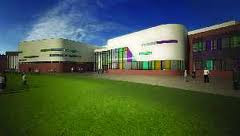To Bishop's Lodge, Springfield Road, for a meeting of the Faith Leaders Forum, starting at 1800. I've been invited to attend specifically to contribute to the start of planning for
Inter Faith Week, Sun 20 - Sat 26 November. Noel Singh (Policy Officer for Community Cohesion at Leicestershire County Council) has been invited for the same purpose.
Bishop Tim himself isn't present; the meeting is chaired by Richard Atkinson, Archdeacon of Leicester and Chair of Trustees at St Philip's Centre for Study and Engagement in a Multi-Faith Society (that's Richard on the left in photo above, along with Chief Inspector Rich Keenan, Leicestershire Constabulary; Dr John Hall, Director of Studies at St Philip's Centre; and Sheikh Ibrahim Moghra, Chair, Interfaith Committee, Muslim Council of Britain). Five of the city's faith communities are represented here this evening. I suppose I could be considered occupying a seat for a sixth, but I've not been invited here to represent the local Bahá'ís.
I've not been invited to one of these meetings before, so I find it helpful when another attendee asks Mike Smith (Policy Adviser and Chaplain to the Bishop of Leicester) briefly to describe the origin and purpose of this group. He explains how it's not constituted on a formal basis (like the Council of Faiths is, for example) which allows it to have a more free-ranging brief, holding informal conversations on subjects that might be a bit more controversial or difficult than those which other organisations might tackle. It was gathered together by (and around) Bishop Tim in the wake of the terrorist attacks of 9/11 and 7/7 - which is appropriate this evening, since the first item on the agenda is the tenth anniversary of 9/11.
In connection with this topic, it's decided that the city's faith communities have to focus on reconciliation, finding common ground and solidarity with Muslims. This tenth anniversary falls on a Sunday, which would allow certain kinds of events in public spaces to be appropriate. We don't know if the City Council or County Council intend to hold anything. We're reminded that this tenth anniversary will be covered extensively in the media - and that if we don't write the story of how it plays out in Leicester, others will.
Other topics tonight include policing issues (in particular a report by the Equality and Human Rights Commission on Leicestershire Constabulary's record on Stop and Search); the omission of Religious Education from the new English Baccalaureate; and the establishment of the new Hindu school in Evington, in the old Leicester Grammar Junior School, adjacent to St Paul's (the school is eager to engage with the wider faith communities of the city and has offered itself as a venue for the next meeting of the Faith Leaders Forum in March).
When Noel and I are asked to speak about Inter Faith Week 2011, he goes first. We're sitting at opposite ends of the room and that's reflected in the kind of things we say. Noel's concerned about Inter Faith Week being a case of preaching to the choir, with same old faces saying the same old things to the same old audiences, in the same old places. He urges getting out and connecting with ordinary people throughout the city and county - going where they are and trying to bring Inter Faith Week to them. He's particularly keen on getting schools involved.
I, on the other hand, think that we made a pretty good fist of getting among the public, through our week-long exhibition in Highcross for the second year running. I say a little about how that came about in 2009, how it went in 2010 and how Highcross has tentatively offered the same opportunity to us again this year.
I don't think I need to go over National Inter Faith Week 2010 (or 2009 for that matter) here. There's enough about them already in this blog (see entries
passim). But in this context I do get to raise a few truisms that I think would be good if we could acknowledge and change. One is the absence from events such as the Highcross exhibition by "faith leaders" who simply don't know how to talk to members of the public. Now I wouldn't want to give the impression that I'm knocking anyone by saying this (and I seem to get agreement round the table when I do). They may be at ease speaking with royalty, MPs, academics and the like, but they'll run a mile from a single mum pushing a double buggy! It's a different mindset and skillset: many of those who enjoy being among the general public at occasions like the Highcross exhibition or the Celebrate One Leicester event would feel ill at ease in the presence of dignitaries and notables. Beyond this, another problem (and a more serious one I believe) is that some of the faith communities at large don't seem interested in supporting an event such as this. Also, in the two years this event has been held so far, there has been little acknowledgment or support from Leicester City Council (only in the form of Lord Mayor Roger Blackmore and his wife Hilary opening the event in 2009).
We discussed what we can do for 2011 that we haven't done before. I mention Chris Minter's offer of the City's Council's Adult Skills and Learning Service getting behind the event. We also have a promising offer of Phoenix Square running a season of themed movies during the week. There's a proposal that we should make a concerted effort to make it something bigger for schools. The idea is raised of each faith hosting one day (making it an eight-day week, but we can sort that out somehow). We also acknowledge the need for appropriate central coordination.







